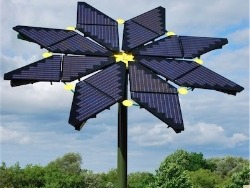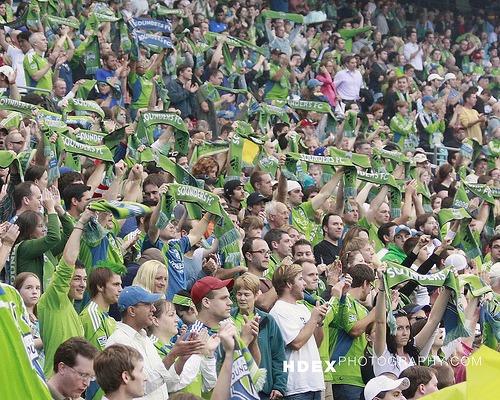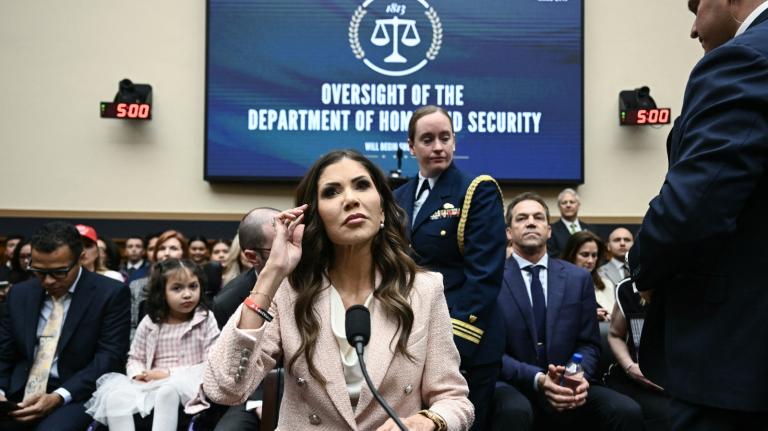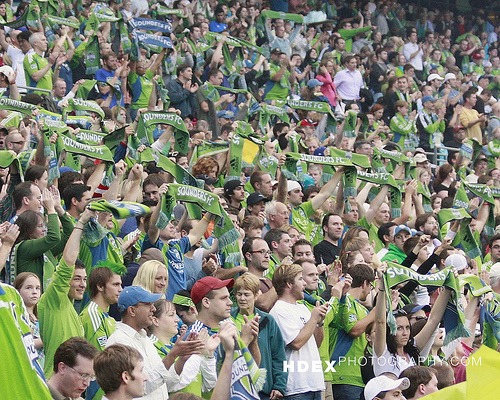 The Seattle Sounders don’t just have crazy fans. Their facilities have a 57.6 percent landfill diversion rate.Photo: Mike HPro sports may not seem like a natural ally for environmentalists. Players fly from Boston to Los Angeles and back for a single game. Leagues and teams convince cities to build expensive and often unneeded new facilities with taxpayer money. Fans clog up roads as they drive to games and clog up trash cans with hot-dog wrappers and beer cups once they arrive.
The Seattle Sounders don’t just have crazy fans. Their facilities have a 57.6 percent landfill diversion rate.Photo: Mike HPro sports may not seem like a natural ally for environmentalists. Players fly from Boston to Los Angeles and back for a single game. Leagues and teams convince cities to build expensive and often unneeded new facilities with taxpayer money. Fans clog up roads as they drive to games and clog up trash cans with hot-dog wrappers and beer cups once they arrive.
But six teams representing six major North American sports leagues have kicked off a new effort to make themselves more sustainable: the Green Sports Alliance. No, they won’t stop flying to games or pushing for plush stadiums, but they will use less energy, recycle and compost more, and green their procurement practices by buying more eco-friendly goods. All of the founding teams are from the Pacific Northwest — MLB’s Seattle Mariners, NFL’s Seattle Seahawks, NBA’s Portland Trail Blazers, NHL’s Vancouver Canucks, WNBA’s Seattle Storm, and MLS’ Seattle Sounders FC — but the alliance aims to get teams from all around the U.S. and Canada to join in.
The Natural Resources Defense Council, which laid the groundwork for the GSA, has been working with pro sports teams and leagues for years to help them get greener. I caught up with NRDC Senior Scientist Allen Hershkowitz to find out what kind of environmental progress is being made in professional sports and how that can ripple out through the broader culture. He was enthusiastic about the leagues’ commitment to a smarter future, and their ability to change not just the way they do business but also hearts and minds. “Sports are the most watched TV shows in the world,” Hershkowitz said. “And if you want to change the world, you’ve got to go where the world is.”
Q. What kind of effect might the greening of pro sports have on business in America?
A. The NBA is now promoting fuel-efficient vehicles at its games. Pepsi has now changed its bottle to [one made from] agricultural waste. I have been in the room when officials of MLB have talked to Pepsi about the environmental impacts of its vending machines and its waste. When Pepsi hears about environmentalism from MLB, it’s a lot more important than hearing about it from the NRDC.
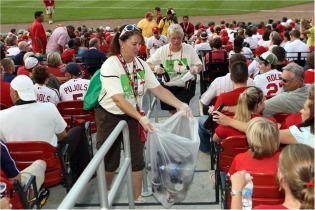 Recycling at the 2009 MLB All-Star Game in St. Louis.With football, we’re going to start seeing more solar panels, recycling, water conservation. People don’t go to football games thinking about the environment, but when they get there and see environmental messaging, it becomes part of their consciousness about the way civilization should be.
Recycling at the 2009 MLB All-Star Game in St. Louis.With football, we’re going to start seeing more solar panels, recycling, water conservation. People don’t go to football games thinking about the environment, but when they get there and see environmental messaging, it becomes part of their consciousness about the way civilization should be.
We use the leverage of these leagues to get our message to the supply chain, which is the holy grail of environmentalism. 95 percent of our products’ impacts happen upstream, before you open the package. If we could get the concessionaires to have more organic food, more local food, that will change agriculture. The Rose Garden Arena in Portland has a grass-fed burger. I’ve worked with the leagues to make more vegetarian options.
How cool would it be if we could get parents who have their kids in little leagues to understand that some of the chemicals used to maintain little league fields are not healthy? NRDC worked with MLB, which builds 50 [little league] fields a year, on design specifications on those fields. Now it’s heavily prioritizing recycled materials and nontoxic chemicals. Now these facility managers in local towns are getting [procurement] specifications from MLB. That mainstreams our issue. There’s a certain force, a cultural potency, that NRDC or Greenpeace could never provide.
Q. How did NRDC get the opportunity to consult with the leagues?
A. The brand name of professional sports is incredibly valuable. Companies pay millions of dollars to put their logo next to the brands because they impart a certain level of nonpartisanship and mainstream America. We approached the leagues and told them we’re going to protect their brand against environmental mistakes and make sure that their environmental messaging is accurate, and they trust us. We don’t want their money, so we’re not just another consulting firm looking for a contract. The authenticity that they have gotten for collaborating with us has got them praised.
It would be terrible for Major League Baseball or the National Football League to be promoting environmentally inferior products under the guise of environmental stewardship. Let’s just take the most crass possible example — “clean coal.” The coal industry would love to be marketing “clean coal” to professional sports, but guess what? They can’t do it, because every professional sports league is in partnership with NRDC and now the GSA when it comes to environmental messaging. We are contacted weekly by the leagues regarding potential sponsors who want to participate in the green space. We tell them yes or no.
For example, Monsanto came to the National Hockey League and said that they wanted to sponsor all of their green work. Gary Bettman, the commissioner, consulted us. We gave him a report on Monsanto. And to his credit, the NHL rejected this really lucrative proposal from Monsanto. This is the kind of information clearing that the GSA is now going to be able to help bring to all leagues throughout the country.
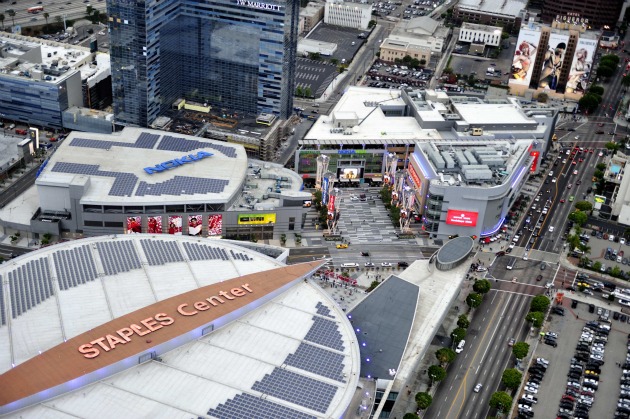 Solar panels line the roof of the Staples Center in downtown Los Angeles, home of the NBA’s Lakers and Clippers.
Solar panels line the roof of the Staples Center in downtown Los Angeles, home of the NBA’s Lakers and Clippers.
Q. What are you trying to accomplish with the Green Sports Alliance?
A. First, it’s going to advocate for measurement of environmental impacts at all stadiums and arenas, nationally, across all leagues. Right now only MLB consistently measures energy use, water use, waste and recycling, and paper procurement consistently. We’re also circulating information about “better practices” (because there is no such thing as the best) to inspire teams. That includes what’s the best way to do fan education.
There are a lot of options out there when it comes to green procurement, and most professional sports teams and leagues do not have the staff to weigh the relative benefits of the various options in terms of biological and ecological value. The GSA will help the teams and the leagues to make the most environmentally authentic [purchasing] decisions.
Q. Why are the leagues interested in more than just the appearance, the brand, the PR of “green,” but in actually helping the environment?
A. You don’t get to be the head of one of these leagues by being stupid or out of touch with culture. The science on climate change is irrefutable. These guys follow the facts. My experience with the commissioners and their staffs is that they are personally committed to this issue.
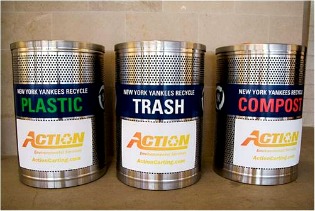 The New York Yankees may be the “Evil Empire,” but they’ve still got recycling and composting.All businesses want brand loyalty. The New York Times wants repeat readers, IBM wants repeat buyers, but they’re nothing like brand loyalty to sports teams. Brand loyalty to sports teams is passed down generation to generation. Brand loyalty is so strong that some of these businesses expect their customers to get into fistfights with customers of other businesses.
The New York Yankees may be the “Evil Empire,” but they’ve still got recycling and composting.All businesses want brand loyalty. The New York Times wants repeat readers, IBM wants repeat buyers, but they’re nothing like brand loyalty to sports teams. Brand loyalty to sports teams is passed down generation to generation. Brand loyalty is so strong that some of these businesses expect their customers to get into fistfights with customers of other businesses.
Sports have to be attuned to our society in a way that other businesses can avoid. Sports cannot avoid paying attention to whether the country is at war or not. Sports cannot avoid civil rights. They cannot avoid racial equality. Sports cannot avoid environmentalism any more, and that’s what this is about. We have helped them realize that and capture that cause.
Breaking down the barrier between macho football and hockey players and crunchy, Birkenstock environmentalists — to me, this is a watershed moment in the environmental community. We have taken our issue to a level of cultural parity that we’ve never achieved before. My mantra is: If you want to change the world, you don’t emphasize how different you are from everyone else. I know environmentalists who pride themselves on the fact that they don’t own a TV. That’s fine for personal reasons, but as a professional advocate, I should be fired if I didn’t own a TV, because how would I know what’s happening in the world that I’m trying to change?
Also, sports are fun. Every neighborhood has a baseball field. Every high school has a sports team. Is this something we should ignore? Why have we ignored this for 40 years? Would I rather spend my next two years lobbying Congress, or would I rather spend my next two years working with MLB, the NFL, the NHL, and the NBA changing the supply chain to sports and doing fan education on the environment?
Q. You could be criticized for lending an imprimatur to practices that are not green enough.
A. We’ve got to be real. If you want to really change the world, you’ve got to deal with the people who really influence the world and meet them on their terms. If I go into MLB and start preaching an environmental message, they’re going to blow me off, but if I go in there and I’m sensitive to their business and what they’re doing and the importance of their league to our culture, then I figure out how to advance my agenda using their business model. This way, they can make money and get more fans while advancing environmentalism, and that’s what we’re beginning to do.
